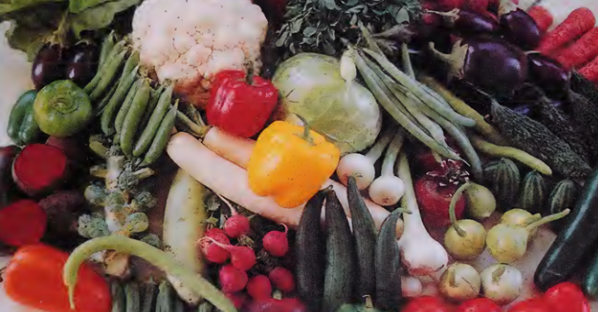The Role of Vegetables in Disease Prevention.

The Role of Vegetables in Disease Prevention
Apart from providing nutrition, vegetables provide protection against many diseases.
They are used in the traditional system of medicine in several countries including India.
For example, bitter gourd is used for treating diabetes; the ash gourd is useful for patients with weak nervous systems.
The use of vegetables in traditional systems of medicine has been dealt with under individual vegetables in this book.
With the advancement of science, researchers have identified several chemical compounds from vegetables which have therapeutic effects against several ailments.
These compounds are known as phytoceuticals.
The most potent among them are;
- antioxidants
- and bioflavonoids.
Antioxidants
These are substances which neutralize free radicals that are formed during the metabolism of foods, by smoking, or exposure to pollutants.
Until neutralized, free radicals damage various body cells thus causing many degenerative diseases associated with ageing, such as heart disease, cancer, arthritis etc.
They can attack blood vessels causing thickening of the arteries and can damage brain cells causing loss of memory, paralysis etc.
Antioxidants neutralize these free radicals neutralizing thus defending the body from the damage caused by them.
Our body produces some antioxidant enzymes which prevent free radical damage.
Free radicals are also neutralized by vitamins (A, B1 B5 B6, niacin, C, E), minerals like selenium and amino acids, some of which are present in adequately higher amounts in some vegetables.
For example, most leafy vegetables, carrots, sweet potatoes, pumpkins and turnip green are rich in beta-carotene (pro vitamin A); beans and peas are rich in essential ammo acids.
Bioflavonoids
Bioflavonoids which are compounds closely associated with vitamin C are found in several vegetables.
They increase the efficiency of vitamin C and protect the body from free radicals.
One such bioflavonoid identified from onion and garlic is quercetin, which has been indicated to give protection against cancer and heart diseases.
Other compounds
Onion and garlic contain several sulphur compounds such as;
- allicin,
- allistalin,
- garlicin,
- diallyl disulphide,
- diallyl trisulphide
- and allyl propyl disulphide
which are effective in reducing harmful blood cholesterol, thus preventing coronary thrombosis, heart attack and stroke.
They are also effective against some bacteria.
Cole crops contain indoles and dithiolthiones which are effective in prevention of cancers of the colon, rectum and breast.
A hypoglycaemic ingredient, keratin, has been isolated from the fruits of bitter gourd which is effective against diabetes.
Diphenyl amine found in onion is also effective against diabetes.
Leguminous vegetables reduce blood cholesterol concentration thus preventing heart attack and stroke.
Celery contains 3-n-butyl phthalide which is effective against hypertension.
Some chemicals that help lower cholesterol in the blood have been detected in brinjal.
It is also rich in bioflavonoids which can prevent stomach cancer.
Certain species of yams contain a substance called diosgenin which is used in the manufacture of cortisone and contraceptive drugs.






